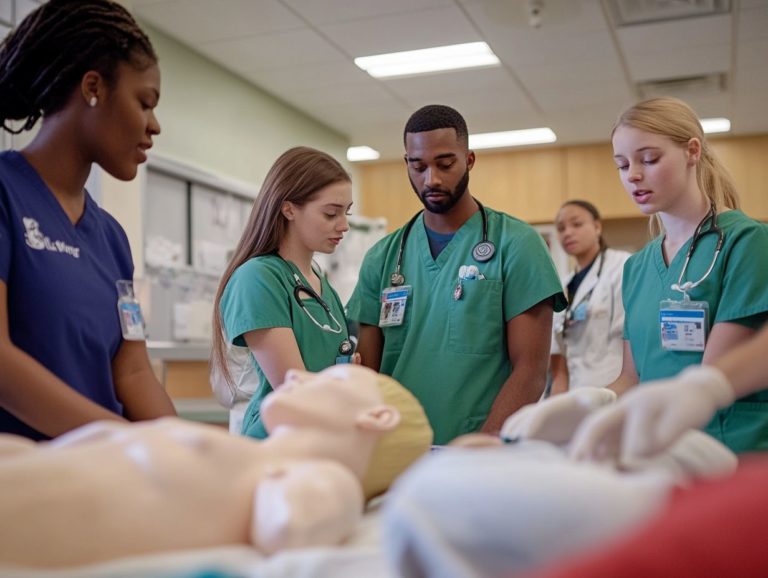The Essential Guide to Medical Assisting Certification
In today s fast-paced healthcare environment, you ll find that medical assistants are invaluable to the smooth operation of medical facilities.
Pursuing medical assisting certification enhances your skills and opens up a world of new career opportunities.
This guide will navigate you through the entire certification process. It highlights the various types of certifications available and the benefits each one offers.
Get ready to uncover essential tips for preparing for exams and maintaining your credentials along the way.
Whether you’re just embarking on your journey or aiming to elevate your career, this guide will equip you right now for success in medical assisting.
Contents
Key Takeaways:

- Medical assisting certification shows your skills and commitment.
- The process includes training, passing an exam, and meeting requirements.
- Certified professionals enjoy better job prospects and higher salaries.
What is Medical Assisting Certification?
Obtaining a Certified Medical Assistant (CMA) certification is essential for anyone looking to become a certified medical assistant in various healthcare environments.
This credential ensures you have the skills and knowledge needed for both administrative duties and clinical patient care.
By earning this certification, you significantly enhance your employability in a rapidly expanding field.
This opens the door to diverse career opportunities within healthcare.
Supported by accredited medical programs and esteemed certification bodies like the American Association of Medical Assistants and the National Center for Competency Testing, you ll be well-prepared to meet the ever-evolving state requirements and the high standards set by employers.
The Certification Process
The certification process for medical assistants encompasses a series of crucial steps.
These steps are carefully designed to guarantee that candidates meet the stringent standards required for earning their Certified Medical Assistant (CMA) certification.
This certification is widely recognized by various authoritative bodies within the healthcare sector.
It reflects your commitment to excellence in this vital field.
Steps to Becoming a Certified Medical Assistant
To become a Certified Medical Assistant (CMA), you ll need to navigate a series of essential steps.
These include pursuing accredited medical training, fulfilling certification requirements, and passing the designated medical assistant exams.
Your journey starts with identifying a recognized medical assistant program.
Preferably, choose one accredited by the Commission on Accreditation of Allied Health Education Programs (CAAHEP) or the Accrediting Bureau of Health Education Schools (ABHES).
Once you’ve completed the necessary training, you ll need to gain hands-on clinical experience.
This helps you refine your skills in patient care and administrative tasks.
Next, you must register for the certification exam administered by the American Association of Medical Assistants (AAMA).
Preparing for this rigorous exam usually involves diving into comprehensive study guides and taking practice tests.
Consider enrolling in review courses to solidify your knowledge in areas such as medical terminology, anatomy, and patient interactions.
By doing so, you’ll ensure that you re thoroughly equipped to excel.
Types of Medical Assisting Certifications

You have a range of medical assisting certifications at your disposal, such as the Certified Medical Assistant (CMA), Registered Medical Assistant (RMA), Certified Clinical Medical Assistant (CCMA), and Certified Medical Administrative Assistant (CMAA).
Each of these certifications is provided by different agencies, tailored to meet the diverse roles within the healthcare environment.
Comparison and Requirements
Dreaming of a rewarding career in healthcare? Understanding certifications is your first step!
When comparing various medical assisting certifications, it s crucial to grasp the differences in certification requirements, examination processes, and the impact each credential has on your job prospects.
This understanding will help you choose the right pathway while highlighting the practical implications of each certification on your career.
Among the most recognized certifications are the Certified Medical Assistant (CMA) and the Registered Medical Assistant (RMA). Each has its own set of educational prerequisites and continuing education requirements.
For example, the CMA typically mandates that candidates complete an accredited program and pass a rigorous exam. The RMA offers more flexibility by accepting varied educational backgrounds, broadening accessibility.
Understanding these nuances can significantly influence your job opportunities, salary expectations, and potential for career growth in healthcare.
Why You Should Get Certified in Medical Assisting
Obtaining medical assisting certification offers a wealth of advantages. It opens doors to enhanced career opportunities and boosts your earning potential.
In a job market where employers favor certified professionals, this certification also provides you with a competitive edge, unlocking amazing job growth opportunities in the thriving healthcare field.
Career Advancement and Opportunities
Medical assisting certification opens a wealth of career advancement opportunities, allowing you to pursue specialized roles in healthcare management, patient education, and administrative support.
This not only contributes to significant job growth in the industry but also positions you at the forefront of a dynamic field.
With a strong foundation in medical knowledge and patient care skills, you can branch into areas such as phlebotomy (the process of drawing blood for tests), medical billing, or even nursing.
This adaptability enhances your resume and equips you to navigate the ever-evolving healthcare landscape.
The rising demand for specialized roles underscores the importance of ongoing training. Commit to learning to stay updated on new technologies and practices.
By maintaining essential credentials from respected organizations like the American Association of Medical Assistants (AAMA), you can boost your career prospects and remain competitive in the job market.
Preparing for the Certification Exam

You need a good plan to prepare for the medical assistant certification exam. This includes effective study techniques and high-quality resources.
Develop a robust understanding of essential concepts like medical terminology and clinical patient care. Mastering these elements is crucial for your success on the exam.
Study Tips and Resources
Here are some effective study tips for preparing for the medical assistant certification exam:
- Craft a personalized study schedule.
- Leverage practice exams.
- Immerse yourself in specialized training programs that reinforce essential knowledge and skills.
You may also find value in supplementary resources, such as textbooks like “Medical Assisting: Administrative and Clinical Procedures” by FA Davis, which offers a thorough overview of both theory and practice.
Online courses on platforms like Coursera and Udemy can deepen your understanding through engaging lessons.
Joining study groups or forums creates a collaborative environment, providing support and motivation. Utilizing practice exams, particularly those offered by the AAMA, can help you pinpoint weaker areas and boost your confidence.
Maintaining Certification and Continuing Education
Maintaining your certification as a medical assistant is essential for your professional development.
It involves diligently adhering to the recertification process, pursuing ongoing training, and fulfilling evolving certification requirements to stay relevant in the ever-changing healthcare landscape.
Renewal Requirements and Options for Further Education
Renewal requirements for medical assistants entail completing a set number of continuing education credits, which can vary across certification agencies. This ensures you remain up-to-date with the latest practices and standards in the healthcare field.
For instance, the American Association of Medical Assistants (AAMA) typically requires you to earn 60 continuing education credits every five years, while the National Healthcareer Association (NHA) may have different criteria, possibly including specific hours dedicated to hands-on training or online courses.
You have many options to fulfill these requirements, such as:
- Join dynamic workshops that boost your skills!
- Enroll in accredited online courses that fit your schedule.
- Participate in relevant conferences to expand your network.
Pursuing advanced certifications like becoming a certified medical administrative assistant can significantly expand your knowledge and skills, helping you shine in a competitive job market.
Regularly attending seminars can help you network while promoting lifelong learning.
Frequently Asked Questions

- What is the purpose of The Essential Guide to Medical Assisting Certification?
- The Essential Guide to Medical Assisting Certification is a helpful guide that assists you in obtaining and maintaining your certification. It provides information on the different types of certifications available, eligibility requirements, exam preparation, and more.
- Who should use The Essential Guide to Medical Assisting Certification?
- Anyone considering a career as a medical assistant or currently working as a medical assistant and wanting to become certified can benefit from this guide. It is also a valuable resource for employers looking to understand the value of certification and how to support their employees in obtaining it.
- What types of certifications are covered in The Essential Guide to Medical Assisting Certification?
- The guide covers the most widely recognized medical assisting certifications, including Certified Medical Assistant (CMA), Registered Medical Assistant (RMA), Certified Clinical Medical Assistant (CCMA), and National Certified Medical Assistant (NCMA).
- What information is included in The Essential Guide to Medical Assisting Certification?
- The Essential Guide includes detailed information on the certification process, eligibility requirements, exam content and preparation, and continuing education requirements. It also offers tips and resources for finding a job as a certified medical assistant.
- Is The Essential Guide to Medical Assisting Certification available in a digital format?
- Yes, it is available as an e-book, making it easily accessible on any device, and can also be purchased in a printed format for those who prefer a physical copy.
- Will The Essential Guide to Medical Assisting Certification guarantee that I pass my certification exam?
- No, the guide is intended to be a helpful resource, but it does not guarantee that you will pass your certification exam. It provides guidance and tips for exam preparation, but ultimately, it is up to the individual to put in the effort and dedication to pass the exam.






